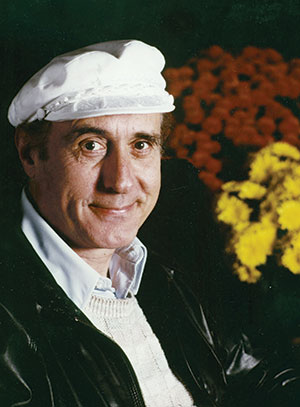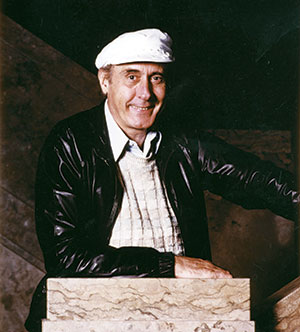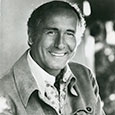
A few years ago Henry Mancini returned to his boyhood home in Aliquippa, Pennsylvania for a Henry Mancini Day celebration complete with marching bands and flowery tributes by civic leaders. That evening after the festivities Mancini ran into a former schoolmate who slapped him on the back and exclaimed, "Hank Mancini, you old son-of-a-gun! What are you doing these days?"
What Hank Mancini is doing these days is actively continuing a career of more than 30 years as a composer, arranger, conductor, and instrumentalist. While his exuberant classmate had apparently never made the connection between the Hank Mancini he knew in school and Henry Mancini the composer of the music for more than 70 films and numerous television programs (not to mention such popular standards as Moon River and Days of Wine and Roses, it is difficult to imagine a TV watcher or moviegoer in America who is unfamiliar with Mancini’s music. Consider, too, the multitudes who attend his concerts and listen to his recordings, as well as those who hear his music in a variety of other circumstances – on the radio, at their children’s band concerts, in restaurants and nightclubs, on airplanes (Delta is currently featuring an hour- long concert of his music as one of its in-flight entertainment choices), on music boxes, and even on video games. It is evident that the music of Henry Mancini is known to millions.
The recipient of countless honors and awards, including 16 Academy Award nominations, 4 Oscars, 65 Grammy nominations (more than any other musician), 20 Grammys, and 7 Gold Records, he is truly a giant in the popular music field.
Tonight Mancini will be appearing in Bloomington, Indiana, where, as composer- arrangerconductor-pianist he will present his Concert Sound of Henry Mancini show. It is early afternoon. In a little more than an hour, Mancini will be rehearsing with an orchestra assembled especially for this performance by his friend and longtime colleague Al Cobine, a Bloomingtonbased bandleader and tenor saxophonist who frequently works with him as musical director and performer. Already the familiar sounds of the pre-rehearsal activities of the stage, lighting, and sound crews fill the auditorium. As we get settled in the inner foyer, I marvel at the calmness with which Mancini has weathered the delays and problems of the morning’s activities. He is a reserved, soft-spoken man who chooses his words carefully and thoughtfully. Yet beneath his quiet demeanor lurks a finely honed wit and subtle sense of humor, both of which he frequently directs at himself.
He begins our conversation with questions about the cassette machine on which the interview is being recorded. This, I learn later, is entirely characteristic and very much a part of his interest in keeping up with the latest developments in the music world: equipment, technology, performers, composers, compositional techniques and style, and every other aspect of the business.
In its earliest form this interest dates back to his childhood in the steel town of Aliquippa, Pennsylvania where, at the age of eight, he was introduced to the flute by his father, who played the instrument himself. When he was 12 he began studying piano and within a few years became interested in composing and arranging. "There was a teacher in Pittsburgh in the ‘30s whose name was Max Adkins. He was an arranger and conducted a pit band at the Stanley Theater in Pittsburgh, and he had a system for teaching arranging. I had been scuffling around, writing things on my own for little bands around town, and I needed some kind of guidance, so I went to Max and studied with him for about three years. He was very influential; he took a kid out of a little town and put me in the right direction."
Other important early influences were the classic film composers, among them Victor Young, Miklos Rozsa, and Alfred Newman. "I was always curious about what they were doing, and I saw most all of the movies of those days." Mancini was also influenced by the music he studied and performed as a young instrumentalist. "I had two great influences: the classical influences that came through the flute, and the classical and jazz influences that came through the piano. I was a big-band fan; I knew all of the bands – who was on fourth trumpet and in what band and all of that. So I had a good feeling for both sides of the fence, which worked out fine when I finally got into movies."
At what point did he actually decide on a career in music? With the hint of a smile comes the deadpan reply: "I kind of always knew it, because I wasn’t qualified for anything else." (He chuckles.) "I think I decided when I was in the service; that’s where I met a lot of the friends who were to help me later to get into the various things that I did." An entry in his high school yearbook shows the beginnings of an even earlier commitment: "Henry Mancini, a true music
Following his graduation from Aliquippa High School, Mancini attended the Juilliard School of Music; but his studies were interrupted by the draft, leading to service overseas in the Air Force and later in the Infantry. After he was released from the service he joined the Glenn Miller-Tex Beneke Orchestra as pianist-arranger. It was there that he met the soon-to-be Mrs. Henry Mancini, Ginny O’Conner, who was singing with the band.
He admits to some favorites among his various efforts over the years, "things that I think have turned out well. Wait Until Dark, for example. I thought The Great Race turned out very well. Two For The Road was another one. Of the more recent ones I thought everything came together very well in Victor /Victoria."
What about The Pink Panther? How did that theme, a perennial favorite among Mancini’s many well-known compositions, come about? "It wasn’t actually The Pink Panther theme at all in the beginning. It was the theme for the David Niven character when he was playing the part of the Phantom. Then Blake Edwards told me he was going to make an animated main title. Although I didn’t know that when I first wrote the theme, everything pointed to that piece as the one that should be there, so it became The Pink Panther theme."
For Mancini, writing a film score begins with the big screen. "I always like to see the picture first in a big theater to get a feeling for the size of it and to see how it looks on a big screen, because when I’m working, I work from a VHS cassette; I talk to the people who are in charge first to see if they have any ideas, then we talk about where the music should be and where it shouldn’t be. In the meantime, if I decide to take the picture, I will have been working on the thematic material; there’s no reason to start writing until everybody knows what the thematic material is going to be. I put something on paper and then make a cassette of it to see if they like it; there’s nothing worse than finishing a score and then having someone say that they don’t like the theme. Then there’s nothing left to do but do it again or get someone else."
Mancini’s composing is done entirely on assignment. He writes each piece as needed and keeps no musical stockpile. "I wasn’t trained to sit someplace and write my symphonies. I’m not geared that way, and I don’t write like that. I have to have a phone call before I can work." Defining the Mancini style presents an interesting challenge. A composer of extraordinary versatility, he tailors his writing to the special demands of each of the individual projects he undertakes, although there seem to be stylistic features that characterize his work, regardless of genre. Not a man who wastes words, he describes his work as "melodic overall, rhythmic
Also reflected in his music is his commitment to keeping abreast of the latest developments in the field. In his book, Sounds and Scores: A Practical Guide to Professional Orchestration, he stresses the necessity for keeping an open mind and staying current:
There was a time when the lines separating Pop, Jazz, Rock, Folk, Country, Latin, and Rhythm and Blues were clearly defined. These lines are crossed with increasing frequency as new and influential performers and writers emerge on the scene. A change in basic concept often follows innovation. We are involved in such a change of concept that, in time, will influence the entire orchestra – live amplified sound …. To ignore this movement in the electronic field would be a serious mistake. Our job deals with musical sound, regardless of its source. The milk of sacred cows has a way of turning sour. The entire music scene is constantly changing, leaving the narrow-minded and the lazy behind. The truly professional writer must keep up with the ever-shifting scene. The man who writes for hire has an obligation, if only to himself, to keep an open mind and to absorb new ideas.
Electronic film scores fall into the category of new concepts; what does he think of them? "Just like orchestra scores, some are great and some are less than great," says Mancini, explaining that although the computer and the synthesizer have come into their own, use of them in films "is just starting to take hold." He cites examples: "The Giorgio Moroder score to Midnight Express was the first; then Kenneth Vangelis did Chariots of Fire. Those are examples of synthesizers being used extensively. Last year Maurice Jarre did a synthesized score for Witness; I thought that turned out very well. I tend to use synthesizers in conjunction with the orchestra. That’s my way, to find places where they can enhance; it’s like having another section in the band. I used them on the album I did with Jim-my Galway (In the Pink) and also on an album of songs from Hollywood musicals I did recently with Johnny Mathis. I’m not adverse to them, and I certainly don’t object to them. I do think, though, that economically there’s a problem with having people do electronic scores. Without the orchestra, someone, something has to suffer; technology always does that to people. And it’s a myth about the synthesized score costing less than a regular score; that’s not true."
The music of Henry Mancini appeals to a broad base of listeners, regardless of generation; and even very young instrumentalists are familiar with many of his compositions, especially those which have been published in simplified arrangements. While he recognizes that writing for beginning- and intermediate level players must take their technical limitations into account, Mancini nevertheless expresses dismay over some of the changes he has seen made in adaptations of his music. "I question some of the arrangements that come across my desk from publishers. Sometimes they simplify rhythms or even change the melody in certain ways. I looked at one arrangement of Peter Gunn for beginning band and they had even changed the bass line."
One can readily understand his concern, particularly in light of the fact that Mancini is considered a master orchestrator and arranger himself. His book on the subject, Sounds and Scores, is now in its third printing and is recognized as an indispensable reference work for the serious writer.
As a performer with 20-some years of experience in various Mancini-led ensembles, Al Cobine has seen how well Mancini’s writing is received by performers as well as listeners. He states: "The comment I always get from people in the orchestra is how well he writes for every instrument. In the popular field there are a lot of acts in the picture who perform with symphony orchestras, but he’s probably the favorite because his music is so well written. The musicians really respect him for that. With a short rehearsal the orchestra sounds well rehearsed, really good, and most of that is in the writing. The concert sound of Henry Mancini is

"When you’re in college you’re able to rehearse. Especially if you’re an instrumentalist, you’re able to have your choice of a lot of outlets: stage band, orchestras, concert bands, all kinds of groups. But what do you do after that? That’s a move that everyone makes differently. I think at that point, depending on what you play or what you want to do, you have to go where the action is. If you want to do commercial work, you look to New York and LA, and maybe Chicago. If you want to do symphonic work, it’s different. Rarely do you step right into a major orchestra; you might have to do a little time in the tules. If you’re in the rock area and you get a chance to go on the road with a group that’s doing well playing any instrument, I’d say go and do it. Don’t be choosy; keep working and don’t wait for someone to hand you what you want, because it’s probably not going to happen that way.
"For composers it’s also important to go through a school course. Most music schools now have electronic set-ups I would definitely go into that, along with the acoustic side of it; if you can bring them both along at the same time, you’ve got a much better chance. But again, when you get out, you have to go where the action is and get into that fire.
"If you’re interested in film writing, USC and UCLA have very good film music courses. Ray Wright has a good program at Eastman, and then there’s the Dick Grove School of Music in the San Fernando Valley. There are others around, but those are the ones that stand out in my mind. Now you have to go to school; the studio system is gone, and you can’t go there to learn it. Each studio used to have an extensive music department, but it’s all done by piecework now. They don’t have anyone under contract; everything is done on a personal basis."
Because he feels strongly about the need for music education, it concerns Mancini that California has eliminated grade school music programs. He sees that move as typical of a growing lack of support for the arts. "I think the present administration has done a great deal to break down the arts programs that we have built up over the years. Music, art, theater, dance, opera – these are all things people talk a great deal about, but not too many of them do much
He also sees some positive elements in the current picture. "To counter that, there’s a great appreciation for music in all forms in this country, an appreciation that is steadily building and hopefully somehow will push the level of support up. I don’t know how that’s going to happen; it might be a pie-in-the-sky thing to think about, but there are thousands and thousands of people going through our schools and into professions who are much better than I ever was at that point, and that brings along a whole different audience with it. Who could have said in the 1940s that someone in the avant garde would fill an auditorium, and yet now Steve Reich does it and so does Philip Glass. So there’s much more of an appreciation now, and a much more discerning audience. When it comes to listening to music for his own enjoyment, Mancini rarely listens for fun; he’s almost always listening for a specific purpose. "I read a lot of periodicals about records, and if I hear that there’s a new recording of the Bartok Concerto for Orchestra that’s outstanding, I’ll go get it. When I heard about the new Paul Simon album, Graceland, I went out and got it. If I’m working on a picture, I’ll do research on records." He does, however, have a large collection ·of solo piano jazz records, which he enjoys. "I love it because it’s something I can’t do. I’m in awe of anybody that can play jazz piano by himself."
Mancini’s heavy schedule of compositional commitments and concert dates doesn’t leave much time for other activities, but he nevertheless manages to pursue some fascinating outside interests. Along with skiing, photography, and painting, he has a great interest in art, and he has assembled a remarkable personal collection that includes four Rodin sculptures and oils by Dauchot, Caffe, Barnabe, Dubuffet, and others; his favorites are a small still life by James Cagney and a water color by Johnny Mercer. He is also an oenophile and his wine cellar is one of the best in Southern California. When I asked him if there was anything he’d like to do that he hadn’t tried yet, I fully expected to hear about some new compositional technique or piece of equipment he found intriguing. Instead, the reply, delivered with a smile and a twinkle in his eye, was, "There’s a new ’85 Bordeaux I haven’t tasted yet."
Mancini died in June 1994 at age 70.





